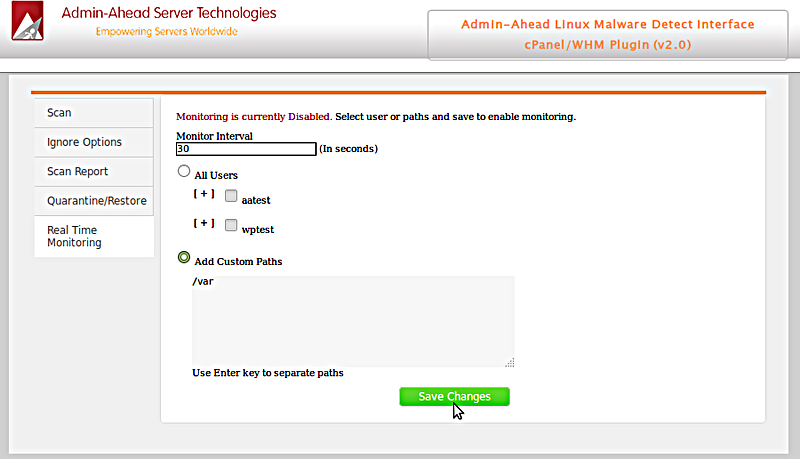Follow these steps in your SSH terminal :
1. Check if inotify is installed in the server.
# which inotifywait
If not already installed, you will get an output like this :
[root@login ~]$ which inotifywait
/usr/bin/which: no inotifywait in (/usr/local/bin:/bin:/usr/bin:/usr/local/sbin:/usr/sbin:/sbin:/home/samurais/bin)
If it is already installed, you will get an output like this :
root@login [~]# which inotifywait
/usr/bin/inotifywait
2. If inotify is missing, proceed to step 5
3. If inotify is present, check the version number using:
# inotifywait --help
4. If inotifywait version is V3.13 (or below), real-time monitoring won't work as maldet does not support inotifywait V3.13 or below
We need the latest version of inotifywait ie; v3.14. The old version needs to be removed as it is provided by atomic repository. Remove using following command:
# yum remove inotify-tools
5. Install epel repo if not present
# yum install epel-release
6. Install inotify-tools from epel
# yum --enablerepo=epel install inotify-tools
7. Verify that the new installation is v3.14 using:
# inotifywait --help
8. Kill the maldet process using
# maldet -k
9. Re-enable real-time monitoring from the plugin interface and it should work.

Steps to enable real-time monitoring :
* Enter the monitoring interval in seconds.
* Select the users or custom path to be monitored.
* Click on 'Save Changes' button.
Once real-time monitoring is enabled, you can view the status 'Real-time monitoring enabled' from the plugin interface.
Need help with Linux Malware Detect Manager (cPanel) plugin ?
Click on the following link to open a ticket with us and share the temporary SSH access details to the server and we can provide support for Linux Malware Detect Manager (cPanel).
https://admin-ahead.com/portal/submitticket.php?step=2&deptid=2
* Please make sure the password to the server is temporary, and to reset once the task is complete.
